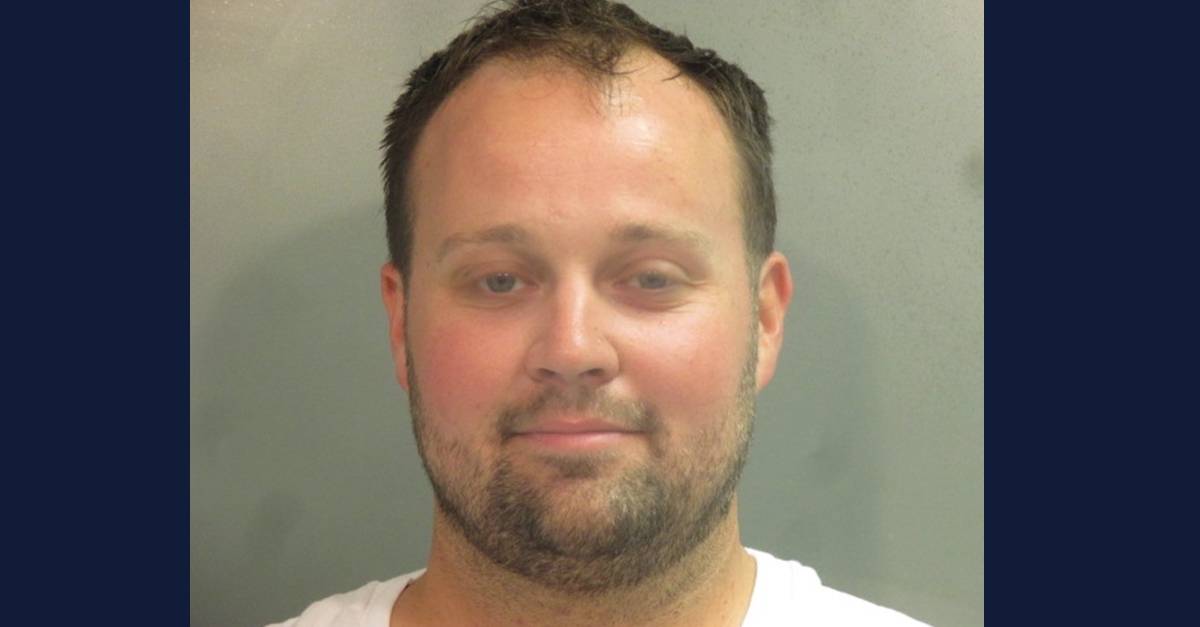
Josh Duggar appears in a mugshot via the Washington County Jail.
Disgraced reality TV star Josh Duggar asked a federal appeals court to give him a new trial on charges of downloading and possessing child sexual abuse material on Thursday, according to federal court records.
The Eight Circuit Court of Appeals did not indicate how it was inclined to rule on the request.
Duggar, 34, was arrested in April 2021 after a detective in Little Rock, Arkansas, noticed child pornography files connected to a computer at his car dealership. He traced them back to the onetime conservative activist and star of TLC’s “19 Kids and Counting.”
The popular reality show was canceled in 2015 after Duggar apologized amid allegations that he molested four of his sisters and a babysitter. Around the time, he also admitted to having a profile on the extramarital affairs website Ashley Madison and released a statement calling himself the “biggest hypocrite ever.”
Duggar had allegedly touched at least five girls’ breasts and genitals, often while they slept, USA Today reported. The newspaper attributed the accusation to police records which contained statements by Josh Duggar’s father, Jim Bob Duggar, who said he was relaying information to police that his son told him.
Josh Duggar was found guilty of child pornography charges in December 2021.
His defense unsuccessfully argued that someone else downloaded and uploaded the files.
During Thursday’s hearing, Duggar’s lawyer Justin Gelfand argued the court denied his client the opportunity to present a complete defense by using a test previously deemed unconstitutional by the U.S. Supreme Court.
The lower court erred, Duggar’s attorney argued, by severely limiting the testimony of the man who the defense has consistently attempted to claim was the actual perpetrator of the crime, an employee who worked at the car dealership.
“The district court expressly said that we could call [the employee] for a very limited purpose,” Gelfand said. “We could ask him whether he had knowledge or recollection of being present on the lot between May 13th and May 16th and whether he re-moted in. But what the district court next said is critical.”
The defense attorney then read from the trial court transcript.
“He said, ‘If he says he wasn’t there and didn’t remote in’ – in other words if he denies committing the crime for which Mr. Duggar was on trial – quote, ‘that’s as far as you’re going to get,'” Gelfand said. “And he further explained that he would not permit impeachment based on [the employee’s] prior felony conviction for a crime against a child, a sex crime against a child.”
The appeals court pushed back, but the attorney said the lower court explained their justification for limiting the employee’s testimony based on a test that the nation’s highest court had previously invalidated.
That test, Gelfand said, was expressed by the lower court as weighing the strength of the government’s case against the defense’s case and choosing, in pre-trial rulings, what sort of evidence would make it to jurors’ ears.
And such a test, Gelfand argued, is unconstitutional.
Duggar’s appellate attorney offered two other major reasons he thought his client was entitled to a new trial.
Duggar was interrogated outside the presence of his attorney after police took his phone when he tried to contact his counsel, Gelfand said.
He accused the trial court of erring by allowing the state to use an expert witness who testified as a lay witness regarding a “critical issue in the case.”
That issue, Gelfand said, was certain metadata. Additionally, he said, the trial court denied the defense’s expert witness the opportunity to critique the methodology used by the state’s expert witness on that topic.
During a bond hearing in May 2021, a federal agent testified that Duggar had dozens of photographs and videos depicting the sexual abuse of children, including toddlers.
One video found on a computer in a car lot he owned was called “Daisy’s Destruction,” considered one of the “Top Five Worst of the Worst” that the federal agent ever had to examine because it depicted the sexual assault of an 18-month-old girl.
Have a tip we should know? [email protected]